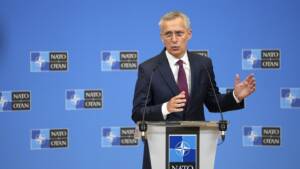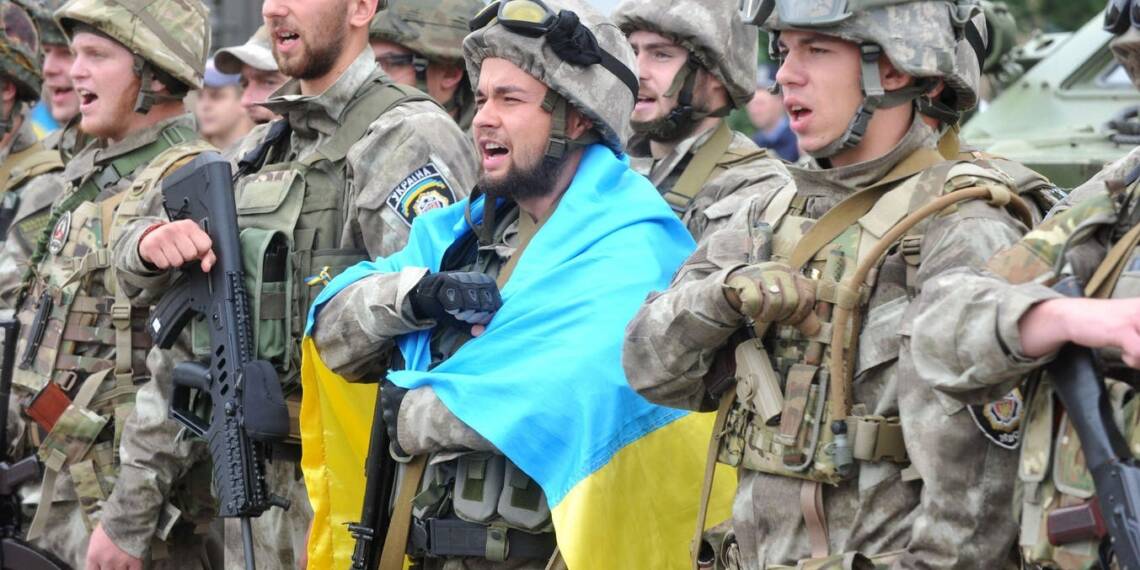Ukraine is losing men, money and land. But the West is dreaming big. And now saner voices in the West have begun challenging the status quo.
Jens Stoltenberg, during Sweden’s NATO membership ceremony, maintained a firm stance on the conflict, emphasizing that surrender is not a viable route to peace. Stoltenberg advocates for bolstering Ukraine’s strength to dissuade Putin from expecting victories on the battlefield.

Join us on Telegram: https://t.me/tfiglobal
Contrastingly, a leaked French military report, as revealed by French media, critiques the reliance on purely military solutions to end the hostilities. It argues that based on the current balance of forces, a military victory for Ukraine is unattainable.
The French report’s significance is magnified by France’s substantial military involvement in Ukraine, marked by significant casualties from Russian attacks. This involvement reflects President Emmanuel Macron’s visibly increasing frustration and combative rhetoric, pointing to a critical view of the ongoing military strategy.
Read More: Why Macron is SECRETLY SCARED of Ukraine
The situation encapsulates a stark dichotomy between the analytical perspectives of Western experts, who emphasize the practical limits and consequences of continued military engagement, and the often more belligerent rhetoric employed by Western political figures.
The discourse surrounding the war in Ukraine has recently highlighted a notable divergence within Western political and media landscapes. Strikingly, it appears that the roles traditionally played by political leaders and the media have, in some sense, been inverted.
Historically, the media was often the source of “wild dreams” and extreme rhetoric, while political figures were expected to embody a more measured and responsible approach to international affairs. However, the current situation reveals a scenario where political leaders engage in rhetoric and propositions that seem detached from the cautious and reasoned approach typically associated with their roles.
Notably, French President Emmanuel Macron’s suggestion that the deployment of NATO troops to support President Zelensky’s regime was a possibility, though not immediately planned, was promptly moderated by French Defence Minister Sebastian Lecornu, clarifying that such a decision was not currently being considered. Similarly, Polish Foreign Minister Radoslaw Sikorski’s advocacy for an “asymmetric escalation” by NATO, including the potential deployment of NATO troops in Ukraine, underscores the radical shift in discourse.
Amidst this backdrop of escalating rhetoric, it is noteworthy that a portion of the media and expert analysis seeks to reintroduce a voice of reason into the conversation. An example of this more measured approach is an article published by Foreign Policy, a leading American magazine on international affairs. The article, titled “NATO Should Not Accept Ukraine – for Ukraine’s Sake,” penned by Stephen Walt and Robert Renée Belfer, challenges the prevailing narrative by arguing against Ukraine’s NATO membership.
The article presents a significant deviation from the prevalent Western narrative on Ukraine’s potential NATO membership, motivated by a nuanced assessment of the conflict’s realities. One critical factor influencing the authors’ stance is the ongoing military challenges faced by Kyiv. They argue that Ukraine’s prospects of reversing its battlefield losses and reclaiming territory are bleak without substantial increases in military aid and time to rebuild its forces. This skepticism is rooted in observations of Ukraine’s severe manpower shortages and the tactical difficulties posed by drone surveillance, artillery, and entrenched Russian defenses, which collectively hinder Kyiv’s ability to achieve major territorial gains. Contrary to the optimistic forecasts of Ukraine’s advocates in the West, the article suggests that expectations for a successful Ukrainian counteroffensive have been consistently overestimated.
Beyond the military dimension, the article posits that the underlying rationale for the authors’ perspective is fundamentally psychological, focusing on the question of which side—Russia or the West—demonstrates a greater commitment to Ukraine’s future. The conclusion drawn is that Russian leaders exhibit a deeper concern for Ukraine than their Western counterparts.
Read More: EU ’s unexpected SHOCKER to Ukraine.
Foreign Policy’s critique extends to a broader indictment of Western policy, suggesting that NATO’s ambition to include Ukraine never truly aligned with Ukrainian interests, as evidenced by the conflict’s escalation. The admission that the prospect of NATO membership for Ukraine likely provoked Russian aggression challenges a narrative long maintained in Western capitals.
And the biggest irony is that the EU is pushing Ukraine for a fight but has now started sending Ukraine long war bills. Yes, the EU’s so-called support is now paid membership.








